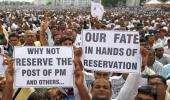In a setback to the Manohar Lal Khattar government, its law providing 75 per cent reservation in private sector jobs to the residents of the state was quashed on Friday by the Punjab and Haryana High Court which declared it "unconstitutional".

Justices G S Sandhawalia and Harpreet Kaur Jeewan also held the Haryana State Employment of Local Candidates Act, 2020 "ultravires" and said it will become "ineffective from the date it came into force".
Senior advocate Akshay Bhan, the counsel for one of the petitioners, said the bench quashed the complete Act. He said it was argued by the petitioners that the act violated Articles 14 and 19 of the Constitution.
In its 83-page judgement, the court said, "We are of the considered opinion that the writ petitions are liable to be allowed and The Haryana State Employment of Local Candidates Act, 2020 is held to be unconstitutional and violative of Part III of the Constitution of India and is accordingly held ultravires and the same is ineffective from the date it came into force."
The court had admitted multiple petitions against the act that came into effect from January 15, 2022 and provided 75 per cent reservation in jobs in the private sector to candidates from the state. It covered jobs offering a maximum gross monthly salary or wages upto Rs 30,000.
Advocate Bhan, who was representing the Faridabad Industrial Association, said several industrial associations had moved against the Haryana government's Act.
The state did not have legislative competence under Article 35 for enacting this law, Bhan contended.
In its order, the bench said, "The underlying object of the legislation, as has been succinctly put by counsel for the petitioners, is to create an artificial gap and a discrimination qua the citizens of India."
The court was of the opinion that it is beyond the purview of the state to legislate on this issue and restrict private employers from recruiting from the open market for the category of employees who were receiving less than Rs 30,000 per month.
"It is not for the state as such to direct the private employer who it has to employ keeping in view the principles of laissez faire that 'the lesser it governs, the better itself'," said the court.
"It (the state) cannot as such discriminate against individuals on account of the fact that they do not belong to a certain state and have a negative discrimination against other citizens of the country," it said.
Citing an example, the court said a private builder raising a multi-storeyed complex cannot be asked not to employ a person who is skilled in the work of installation of wood work who might come from a particular area of the country that is Kashmir.
"Once there is a bar under the Constitution of India, we do not see any reason how the State can force a private employer to employ a local candidate as it would lead to a large scale similar state enactments providing similar protection for their residents and putting up artificial walls throughout the country, which the framers of the Constitution had never envisaged," stated the order.
The court observed that the concept of constitutional morality has been openly violated by introducing a secondary status to a set of citizens not belonging to the state of Haryana and curtailing their fundamental rights to earn their livelihood.
The court also stated that there is a bar under the Constitution on discrimination among citizens in matters of employment on the basis of their places of birth and residence.
The act was applicable to employers of private sector companies, societies, trusts, limited liability partnership firms, partnership firms, and any person who employs 10 or more persons on salary, wages, or other remuneration for manufacturing, carrying on business, or rendering any service in Haryana.
Providing 75 per cent reservation in private sector jobs for the state-domiciled in the private sector was a key poll promise of the Jannayak Janta Party at the time of 2019 assembly polls.
After the polls, JJP extended support to Bharatiya Janata Party and formed a government in alliance with them after the saffron party fell short of attaining a simple majority on its own.











 © 2025
© 2025